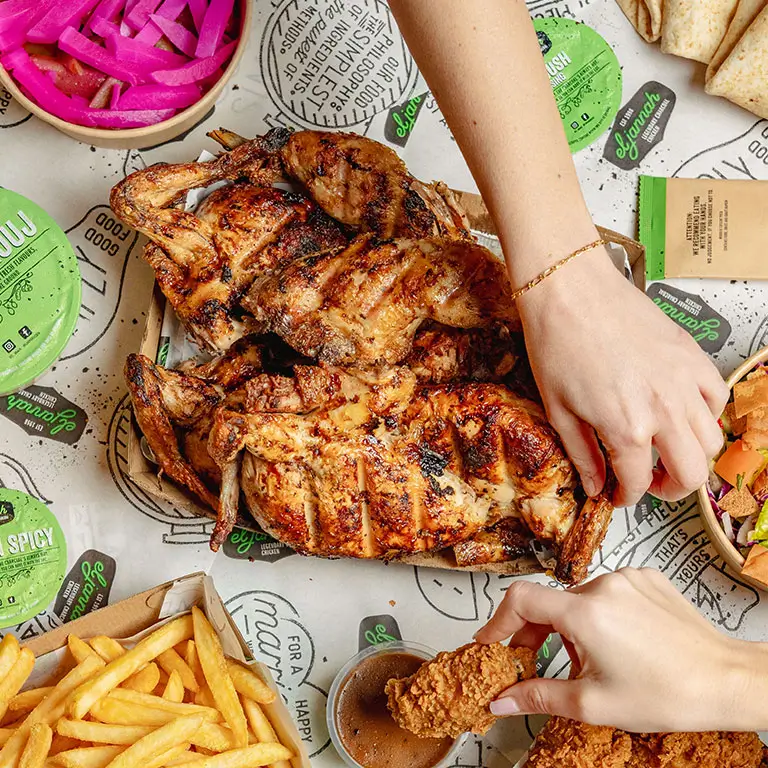How much protein is in chicken?
Every workout is an investment in your body, and what you eat afterward can make the difference between good and great results. It also makes a difference towards your goals – are you trying to build mass and muscle or lose weight.
Whether you’re a weekend warrior, a dedicated gym-goer, or a professional athlete, understanding post-workout nutrition is crucial to maximising your gains.

Understanding Post-Workout Nutrition: The Story Behind Recovery
Let’s learn a bit more about what the deal is with post-workout meals.
Why Post-Workout Nutrition Matters
After an intense workout, your body is like a finely tuned machine that needs precise refueling. During exercise, you:
- Deplete glycogen stores
- Create microscopic muscle tears (this is the process of hypertrophy)
- Lost essential electrolytes through sweat
The right nutrition can dramatically accelerate your recovery process, supporting muscle growth, energy replenishment, and overall performance.
Macronutrients: Protein, Carbs, and Fat
Protein
- Recommended intake: 20-40 grams 2 hours post-workout
- Helps repair and rebuild muscle protein
- Stimulates muscle protein synthesis (10 grams of essential aminos to 25 grams of complete proteins)
- Sources: Chicken, eggs, Greek yogurt, protein powder
Carbohydrates: Restoring Your Energy Reserves
- Replenishes glycogen stores
- Recommended intake: 0.4 grams per pound of body weight
- Optimal within 4 hours post-exercise
Sources: Sweet potatoes, rice, fruits, whole grains
Fat
Contrary to popular belief, some fat post-workout isn’t detrimental. In fact, studies suggest whole milk and whole eggs might be more effective for muscle recovery than their low-fat counterparts.
Timing is Everything: When to Eat After Your Exercise
Is the Anabolic Window real or fake?
The idea of a “anabolic window” – that you must eat protein right after a workout to build muscle – isn’t as set in stone as it might seem. If you’ve trained on an empty stomach, grabbing some protein and carbs right after exercise makes sense to flip your body from breaking down muscle (catabolic) to building it up (anabolic). But if you’ve had a solid pre-workout meal, like a protein shake or a balanced snack, your body is likely still digesting it well into recovery. In this case, the next meal, whether right after your workout or a couple of hours later, should do the job just fine.
Things get trickier if you’re training hours after your last meal. When there’s a longer gap—say, 4-6 hours—your body might benefit from some post-workout protein (around 25 grams) to kickstart recovery and muscle growth. Other factors, like your training experience and age, can also play a role. For instance, older adults and advanced lifters may need to pay closer attention to timing and protein quality to get the best results. While there’s still a lot to learn from long-term studies, the takeaway is simple: your nutrition strategy doesn’t have to be one-size-fits-all. Tailor it to your schedule and goals, and you’ll be on the right track.
Top 5 Post-Exercise Meal Ideas
Workout-Specific Nutrition Strategies
Endurance Training
Carbohydrates:
Carbohydrate intake becomes paramount for endurance athletes, with recommended consumption ranging from 1-4 grams per kilogram of body weight depending on the intensity and duration of the training session. These carbohydrates are critical for rapidly restoring muscle glycogen, which serves as the primary energy source during extended physical activities. The ideal post-workout meal for endurance athletes should incorporate complex carbohydrates from sources like whole grains, sweet potatoes, and fruits, combined with lean proteins to support muscle repair and hydration-rich foods or beverages.
Hydration
Hydration strategies extend beyond simply drinking water. Electrolyte replacement through specialised sports drinks, coconut water, or electrolyte-enhanced beverages can help restore the delicate mineral balance disrupted during intense endurance activities. Sodium, potassium, magnesium, and calcium play crucial roles in muscle function, nerve signalling, and overall recovery, making their replenishment essential for optimal performance and preventing potential cramping or fatigue.
Resistance Training
Protein:
Protein intake becomes the cornerstone of post-resistance training nutrition, with recommended consumption ranging between 20-40 grams every 3-4 hours. This approach ensures a consistent supply of amino acids necessary for muscle repair, growth, and adaptation. The quality of protein matters immensely, with complete protein sources like lean meats, fish, eggs, and dairy providing the full spectrum of essential amino acids required for optimal muscle recovery.
Carbohydrates:
The goal is to restore muscle glycogen without excessive calorie intake. Complex carbohydrates from sources like quinoa, brown rice, and vegetables provide sustained energy and support the overall recovery process. The strategic combination of proteins and moderate carbohydrates helps create an anabolic environment that promotes muscle growth and prevents muscle protein breakdown.
Common Post-Workout Nutrition Mistakes to Avoid
- Skipping meals
- Inadequate protein intake
- Neglecting hydration
- Consuming only simple sugars
- Waiting too long to eat
Conclusion: Your Nutrition, Your Performance
Post-workout nutrition isn’t one-size-fits-all. It’s a personalised journey of understanding your body’s unique needs. By implementing these strategies, you’ll optimise recovery, boost performance, and accelerate your fitness goals.
Ready to Transform Your Fitness Nutrition?
Start implementing these post-workout nutrition strategies today and feel the difference in your recovery and performance!
Disclaimer: Always consult with a healthcare professional before making changes to your diet or exercise routine to ensure you’re making the correct decision!